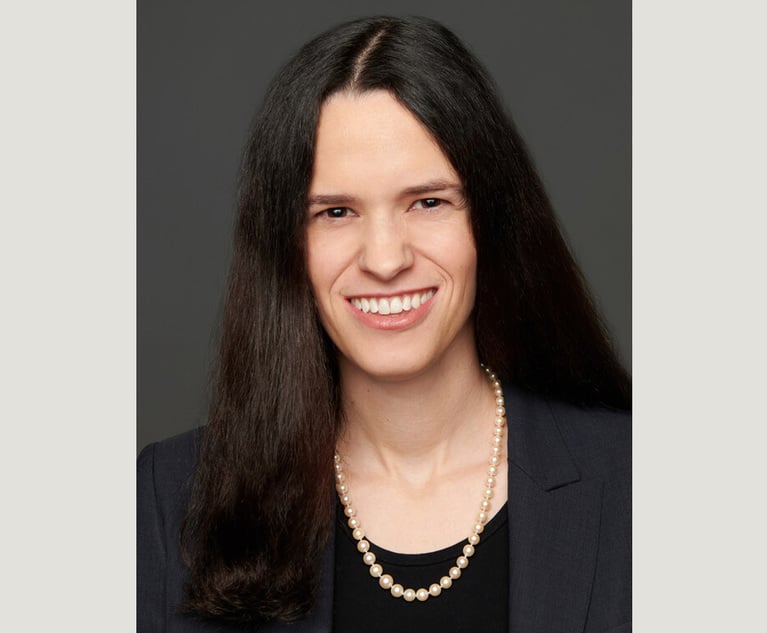How One General Counsel Is Working to Help Connect the World
“There have been fundamental changes where connectivity takes place,” Kalpak Gude, general counsel and head of global regulatory at Swarm Technologies Inc., told a U.S. Chamber of Commerce roundtable Tuesday. “We used to build networks where people work. [Now] we need networks everywhere.”
July 09, 2019 at 05:23 PM
4 minute read
 Photo: Shutterstock
Photo: Shutterstock
Kalpak Gude, general counsel and head of global regulatory at Swarm Technologies Inc., is on a mission to help his company connect the world to low-cost internet through orbiting small satellites.
“There have been fundamental changes where connectivity takes place,” Gude told a U.S. Chamber of Commerce roundtable Tuesday. “We used to build networks where people work. [Now] we need networks everywhere.”
The networks will connect not only people globally, he explained, but also devices in the so-called internet of things.
Swarm Technologies already has several of what engineers call “smallsats” in low orbit. In mid-2020, Gude said, the company has the financial and legal work done to launch a constellation of 150 smallsats.
Swarm hired Gude in January to help with its legal and regulatory issues after the startup last year launched four satellites without regulatory approval. He was not immediately available for comment Tuesday.
The U.S. Federal Communications Commission fined Swarm $900,000 in December and mandated it hire a regulatory compliance director.
The Chamber hosted the forum on smallsats, stressing their growing importance in business. As one Chamber speaker put it, the use of low-orbit satellites is becoming so commercially important that “all companies will soon be space companies.”
Gude explained that smallsats can be used in:
• Agriculture to help reduce water and fertilizer requirements through sensory mechanisms while increasing production.
• The automotive industry, especially on safety devices, such as knowing when an airbag deploys and alerting first responders.
• Development in other countries, such as sensing when an important water pump in, say, India, has stopped providing clean water.
• Transportation, energy, shipping and other areas where tracking and sensory observations are vital.
Gude, and other space industry speakers, stressed that the smallsats are fast, relatively inexpensive to build and easy to launch.
While other types of communications can require cell towers as high as a building or satellites as big as a car, smallsats are the size of your hand, he said.
“The United States is the single country that is irreplaceable in this realm,” he added, in urging a speedy and flexible regulatory structure.
Another speaker, however, warned that China is moving aggressively to find its foothold in smallsats space. He also urged a flexible regulatory structure that would allow U.S. companies to move more quickly.
Besides regulation, the roundtable and speakers covered other smallsats topics such as agile encryption, radio frequency interference and safe deorbit assurance.
Discussing the regulatory requirements, keynote speaker Ajit Pai, chairman of the Federal Communications Commission, said his agency is aware that “we are witnessing a revolution in space” for the first time in 50 years.
“We need to modernize our rules … and streamline our regulatory process with flexible rules that can adapt to new technologies. We want to be the best place in the world to license and launch” new smallsats, he added.
To help “maintain U.S. leadership in this frontier,” Pai said, the commission staff has written new draft regulatory guidelines to make it easier and cheaper to apply for launch approvals. The draft to “streamline the process” will be made public Thursday, he added.
Pai said he hopes to enable the “visionary work by America's space companies” and to “empower the next generation of entrepreneurs.”
This content has been archived. It is available through our partners, LexisNexis® and Bloomberg Law.
To view this content, please continue to their sites.
Not a Lexis Subscriber?
Subscribe Now
Not a Bloomberg Law Subscriber?
Subscribe Now
NOT FOR REPRINT
© 2025 ALM Global, LLC, All Rights Reserved. Request academic re-use from www.copyright.com. All other uses, submit a request to [email protected]. For more information visit Asset & Logo Licensing.
You Might Like
View All

JetBlue Airways Will Pay $2M to Settle DOT Charges of Chronically Delayed Flights

In-House Moves of the Month: Boeing Loses Another Lawyer, HubSpot Legal Chief Out After 2 Years
5 minute readTrending Stories
- 1South Florida Real Estate Lawyers See More Deals Flow, But Concerns Linger
- 2General Counsel Accused of Destroying Evidence
- 32,000 Docket Entries: Complex South Florida Dispute Sets Precedent
- 4Incoming Howard University Law Professor Kiah Duggins Among DC Plane Crash Victims
- 5Bass Berry & Sims Relocates to Nashville Office Designed to Encourage Collaboration, Inclusion
Who Got The Work
J. Brugh Lower of Gibbons has entered an appearance for industrial equipment supplier Devco Corporation in a pending trademark infringement lawsuit. The suit, accusing the defendant of selling knock-off Graco products, was filed Dec. 18 in New Jersey District Court by Rivkin Radler on behalf of Graco Inc. and Graco Minnesota. The case, assigned to U.S. District Judge Zahid N. Quraishi, is 3:24-cv-11294, Graco Inc. et al v. Devco Corporation.
Who Got The Work
Rebecca Maller-Stein and Kent A. Yalowitz of Arnold & Porter Kaye Scholer have entered their appearances for Hanaco Venture Capital and its executives, Lior Prosor and David Frankel, in a pending securities lawsuit. The action, filed on Dec. 24 in New York Southern District Court by Zell, Aron & Co. on behalf of Goldeneye Advisors, accuses the defendants of negligently and fraudulently managing the plaintiff's $1 million investment. The case, assigned to U.S. District Judge Vernon S. Broderick, is 1:24-cv-09918, Goldeneye Advisors, LLC v. Hanaco Venture Capital, Ltd. et al.
Who Got The Work
Attorneys from A&O Shearman has stepped in as defense counsel for Toronto-Dominion Bank and other defendants in a pending securities class action. The suit, filed Dec. 11 in New York Southern District Court by Bleichmar Fonti & Auld, accuses the defendants of concealing the bank's 'pervasive' deficiencies in regards to its compliance with the Bank Secrecy Act and the quality of its anti-money laundering controls. The case, assigned to U.S. District Judge Arun Subramanian, is 1:24-cv-09445, Gonzalez v. The Toronto-Dominion Bank et al.
Who Got The Work
Crown Castle International, a Pennsylvania company providing shared communications infrastructure, has turned to Luke D. Wolf of Gordon Rees Scully Mansukhani to fend off a pending breach-of-contract lawsuit. The court action, filed Nov. 25 in Michigan Eastern District Court by Hooper Hathaway PC on behalf of The Town Residences LLC, accuses Crown Castle of failing to transfer approximately $30,000 in utility payments from T-Mobile in breach of a roof-top lease and assignment agreement. The case, assigned to U.S. District Judge Susan K. Declercq, is 2:24-cv-13131, The Town Residences LLC v. T-Mobile US, Inc. et al.
Who Got The Work
Wilfred P. Coronato and Daniel M. Schwartz of McCarter & English have stepped in as defense counsel to Electrolux Home Products Inc. in a pending product liability lawsuit. The court action, filed Nov. 26 in New York Eastern District Court by Poulos Lopiccolo PC and Nagel Rice LLP on behalf of David Stern, alleges that the defendant's refrigerators’ drawers and shelving repeatedly break and fall apart within months after purchase. The case, assigned to U.S. District Judge Joan M. Azrack, is 2:24-cv-08204, Stern v. Electrolux Home Products, Inc.
Featured Firms
Law Offices of Gary Martin Hays & Associates, P.C.
(470) 294-1674
Law Offices of Mark E. Salomone
(857) 444-6468
Smith & Hassler
(713) 739-1250







